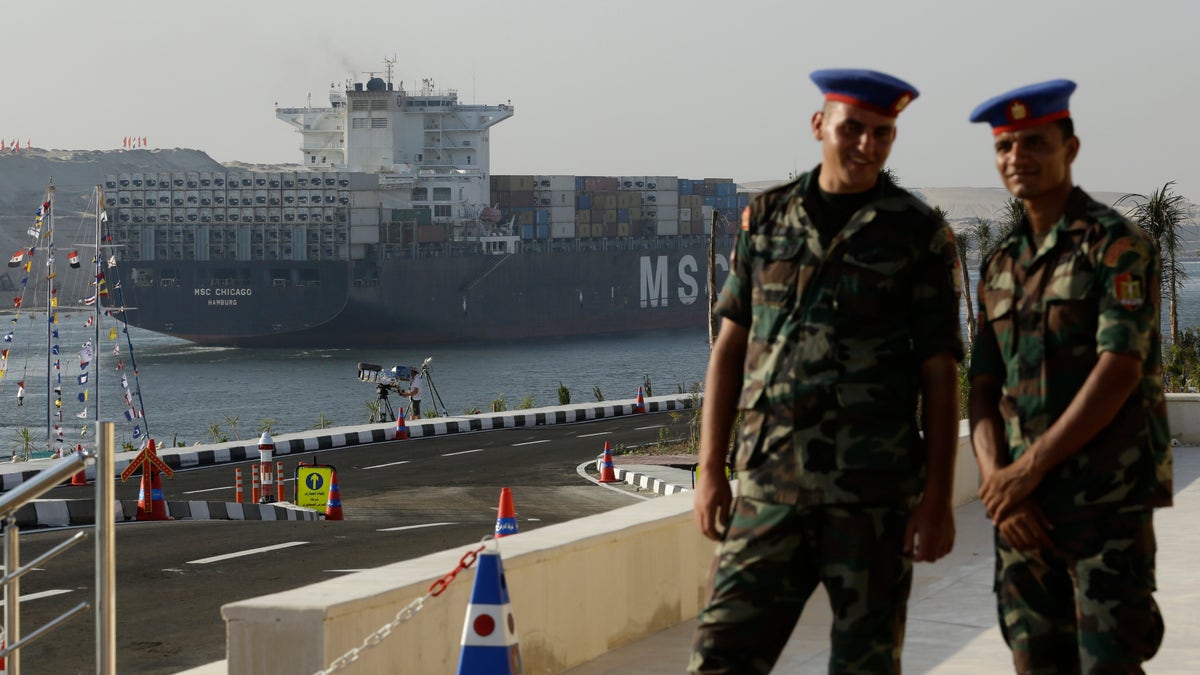
Aug. 6, 2015 - Egyptian army soldiers watch a cargo container ship cross the new section of the Suez Canal after the opening ceremony in Ismailia, Egypt. President Abdel-Fattah el-Sissi, has billed the canal extension as an historic achievement needed to boost the country's ailing economy.
Egyptian President Abdel-Fattah el-Sissi unveiled a major extension of the Suez Canal Thursday, dubbed as “The Great Egyptian Dream,” that many hope will revive the country's ailing economy after years of unrest.
The new Suez Canal extension involved digging and dredging along 45 miles of the 120-mile canal, making a parallel waterway at its middle that will facilitate two-way traffic. With a depth of 79 feet, the canal now allows the simultaneous passage of ships with up to a 66-foot draught.
The project was initially estimated to take three years, but el-Sissi ordered it completed in one, something the pro-government media hailed as evidence of the president's resolve and seriousness.
The opening was celebrated with much fanfare, including ubiquitous billboards and declaration of a national holiday. Egyptian flags adorned streets across Egypt, along with banners declaring support for el-Sissi and hailing his latest achievement. Patriotic songs, some written especially for the occasion, blared from TV and radio stations Thursday.
El-Sissi conceded that the $8.5 billion project will not bring a quick economic windfall to a country roiled by violence and unrest since 2011. Its completion, he said in a speech Thursday, was but the first of a 1,000-step journey Egyptians must take toward economic recovery.
"Egyptians have made a huge effort so as to give humanity this gift for development and construction," el-Sissi said to a cheering audience, his words interrupted at times by the horns of container ships using the new extension.
The magnitude of the project, its completion on schedule 13 months into his presidency and the large high-level foreign representation at its unveiling were likely to bolster el-Sissi's already high standing among many Egyptians -- pushing aside, at least for a time, his reputation as an authoritarian leader with little regard for human rights or liberties.
Playing into his hands is a clear shift by many Egyptians away from the need for democratic freedoms and toward economic survival as a top priority -- not surprising in a country where nearly half the population is below or hovering just above the poverty line.
Wearing his ceremonial military uniform and trademark dark sunglasses on a sweltering August day, el-Sissi flew to the site aboard a military helicopter and immediately boarded the same monarchy-era yacht that dignitaries sailed on during the canal's inauguration in 1869.
The vessel, bedecked in Egyptian and foreign flags, was flanked by navy warships as helicopters, fighter jets and military transport aircraft screamed overhead. A triumphant el-Sissi stood on the upper deck, waving to well-wishers and folklore dance troupes performing on shore.
Tight security was in place at an elaborate ceremony held in the canal city of Ismailia and attended by foreign dignitaries, including French President Francois Hollande, King Abdullah of Jordan and Bahrain's King Hamad bin Isa Al Khalifa.
Palestinian President Mahmoud Abbas, Kuwait's Emir Sheik Sabah Al Ahmed Al Sabah and Greek Prime Minister Alexis Tsipras also attended, as well as Yemen's exiled President Abed Rabbo Mansour Hadi and Sudanese President Omar al-Bashir.
The canal extension has been trumpeted as a historic achievement by pro-government media and has revived the nationalistic personality cult built around the 60-year-old el-Sissi, who as army chief led the overthrow of an Islamist president in 2013 and was elected to office last year in a landslide vote.
Banks and most businesses were closed and authorities, in sharp contrast to the government's zero tolerance for political demonstrations, allowed people to gather on streets and squares to celebrate the occasion.
The government says the project, funded entirely by Egyptians, millions of whom bought canal bonds, will more than double the canal's annual revenue to $13.2 billion by 2023, injecting much-needed foreign currency into an economy that has struggled to recover from the 2011 uprising that toppled President Hosni Mubarak.
Economists and shippers, however, have questioned the value of the project, saying the increased traffic and revenues the government is hoping for would require major growth in global trade, which seems unlikely.
On Thursday, el-Sissi appeared to acknowledge that the project would not yield an immediate windfall, saying it was also meant to reassure his countrymen and the world that Egyptians "are still capable" of great accomplishments.
El-Sissi called the Canal Egypt's gift to the world. But some question whether the billions it took to renovate the Canal could have been better spent.
"There isn't anything new to be celebrating. There are more important things for Egyptian people that this money could have been used for," Mahmoud, 24, told Sky News as he walked past Cairo's Tahrir Square Thursday.
The man-made waterway linking the Red Sea to the Mediterranean, which was inaugurated in 1869, has long been a symbol of Egyptian national pride. Pro-government media have compared el-Sissi to former President Gamal Abdel Nasser, a charismatic leader whose nationalization of the canal in 1956 was seen as a defiant break with the country's colonial past.
The Associated Press contributed to this report.







































